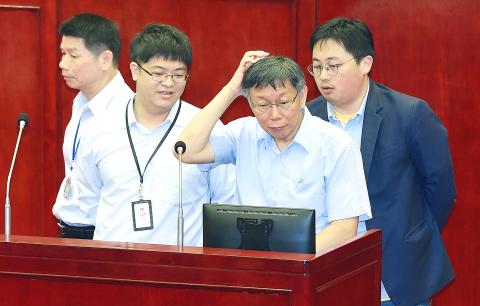The Human Rights Network for Tibet and Taiwan yesterday demanded an apology from Taipei Mayor Ko Wen-je (柯文哲) for saying that Tibetan lamas were causing trouble for the Chinese government by self-immolating.
Ko on Wednesday said at a Taipei City Government briefing on public safety that self-immolation was a “trendy” thing to do among Tibetan lamas, adding that the behavior “caused great trouble for the Chinese government.”
Self-immolation is a public safety hazard and “not a very good way to commit suicide,” he said.

Photo: Liao Chen-huei, Taipei Times
“Why would anyone choose self-immolation to take their own life? That is weird. Why self-immolation? I do not get it,” he said, laughing.
Group president Tashi Tsering yesterday said that he found Ko’s remarks to be “infuriating” and impossible to understand.
Despite being an influential political figure, Ko appears to be oblivious to the suffering of people in Tibet, Xinjiang and Hong Kong under the authoritarian rule of the Chinese Communist Party, and uninterested in learning about the truth, he said.
“He is only willing to speak for the Chinese government and only worried that people’s protests would lead to inconvenience for the government,” Tashi said, adding that the mayor should apologize for his remarks.
Tibetans have not chosen self-immolation to be trendy, but rather to stand up for people who are suffering, the group said, adding that many of them left behind a letter stating their beliefs and calling for freedom.
Ko’s remarks appeared to blame Tibetans for causing trouble while ignoring the Chinese government’s crackdowns on Tibetan religion, culture and human rights, said independent Legislator Freddy Lim (林昶佐), who is head of the Taiwan Parliamentary Group for Tibet.
Self-immolation has been the most poignant form of protest by Tibetans to safeguard their faith and dignity against the Chinese government’s relentless suppression, he said, adding that at least 159 Tibetans have self-immolated since 2002.
“Who chooses self-immolation just because it is a trendy thing to do?” Lim asked, adding that politicians should be more sympathetic.
During a question-and-answer session at the Taipei City Council yesterday, New Power Party Taipei City Councilor Lin Ying-meng (林穎孟) asked the mayor to take back his controversial remarks, which she said went against the city’s values of freedom, democracy and human rights.
Ko said that words spoken cannot be retracted, adding: “I am still not a fan of radical protests.”

AGING: As of last month, people aged 65 or older accounted for 20.06 percent of the total population and the number of couples who got married fell by 18,685 from 2024 Taiwan has surpassed South Korea as the country least willing to have children, with an annual crude birthrate of 4.62 per 1,000 people, Ministry of the Interior data showed yesterday. The nation was previously ranked the second-lowest country in terms of total fertility rate, or the average number of children a woman has in her lifetime. However, South Korea’s fertility rate began to recover from 2023, with total fertility rate rising from 0.72 and estimated to reach 0.82 to 0.85 by last year, and the crude birthrate projected at 6.7 per 1,000 people. Japan’s crude birthrate was projected to fall below six,

US President Donald Trump in an interview with the New York Times published on Thursday said that “it’s up to” Chinese President Xi Jinping (習近平) what China does on Taiwan, but that he would be “very unhappy” with a change in the “status quo.” “He [Xi] considers it to be a part of China, and that’s up to him what he’s going to be doing, but I’ve expressed to him that I would be very unhappy if he did that, and I don’t think he’ll do that. I hope he doesn’t do that,” Trump said. Trump made the comments in the context

SELF-DEFENSE: Tokyo has accelerated its spending goal and its defense minister said the nation needs to discuss whether it should develop nuclear-powered submarines China is ramping up objections to what it sees as Japan’s desire to acquire nuclear weapons, despite Tokyo’s longstanding renunciation of such arms, deepening another fissure in the two neighbors’ increasingly tense ties. In what appears to be a concerted effort, China’s foreign and defense ministries issued statements on Thursday condemning alleged remilitarism efforts by Tokyo. The remarks came as two of the country’s top think tanks jointly issued a 29-page report framing actions by “right-wing forces” in Japan as posing a “serious threat” to world peace. While that report did not define “right-wing forces,” the Chinese Ministry of Foreign Affairs was

PREPAREDNESS: Given the difficulty of importing ammunition during wartime, the Ministry of National Defense said it would prioritize ‘coproduction’ partnerships A newly formed unit of the Marine Corps tasked with land-based security operations has recently replaced its aging, domestically produced rifles with more advanced, US-made M4A1 rifles, a source said yesterday. The unnamed source familiar with the matter said the First Security Battalion of the Marine Corps’ Air Defense and Base Guard Group has replaced its older T65K2 rifles, which have been in service since the late 1980s, with the newly received M4A1s. The source did not say exactly when the upgrade took place or how many M4A1s were issued to the battalion. The confirmation came after Chinese-language media reported